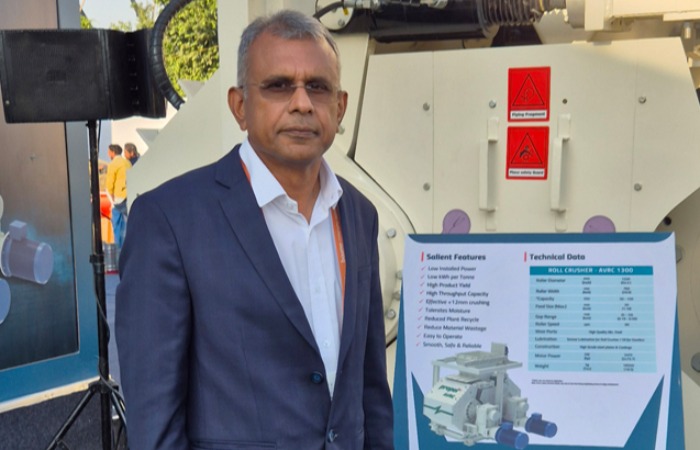
Propel is at the forefront of digital transformation.”
V Senthil Kumar, Managing Director of Propel Industries, discusses key technological advancements in crushing and screening equipment and the future of the market in India.
What is the current demand for crushing and screening equipment in India’s construction and mining sectors?
The Indian infrastructure sector is stable, supported by strong government investments and policy direction. Unlike in other regions where global trade tensions may disrupt demand, India’s domestic construction equipment market remains resilient and forward-moving. In this context, the tariffs may also serve as a trigger for Indian manufacturers to invest in innovation and quality improvements, enabling them to become more competitive globally in the long run.
With a compound annual growth rate (CAGR) of 40 per cent in the previous financial year, Propel is fully prepared to meet a potential surge in both domestic and international demand. Our ongoing capacity enhancements and streamlined production systems equip us to respond rapidly to market needs. However, to fully capitalise on the opportunities presented by this evolving global trade environment, we believe continued policy support from the Indian government is essential, particularly in stabilising freight costs and improving logistics infrastructure. Overall, while global tariff uncertainties present challenges, they also open new doors. For Indian construction and mining equipment manufacturers, this is a moment to rise, adapt, and lead on the world stage.
What are the key technological advancements in crushing and screening equipment?
The construction industry is undergoing a digital transformation, and Propel is at the forefront with tools like Prolive, Proconnect. Prolive enables real-time monitoring of equipment performance based on usage patterns, providing contractors with actionable insights to improve machine efficiency, uptime, and availability.
This level of digital integration supports adherence to stringent quality standards and helps meet accelerated execution timelines. When combined with industry-standard platforms such as Building Information Modelling (BIM), the result is a connected construction ecosystem that enhances project coordination, minimises errors, and ensures seamless execution from planning through commissioning.
Infrastructure projects demand exceptional levels of precision, safety, and quality control. Propel supports these requirements by integrating advanced technologies such as LiDAR and GPS-based sensors into our operations. These tools enable continuous machine tracking and real-time performance assessment, helping operators maintain optimal feed rates and utilise the machine’s maximum productivity through choke feeding.
How are manufacturers improving the efficiency and environmental impact of these machines?
In today’s infrastructure landscape, reducing carbon footprints has become a core priority. At Propel Industries, we are committed to contributing to a greener construction ecosystem through innovation in equipment design and operational efficiency. Our entire range of track-mounted equipment is engineered with a diesel-electric configuration. This hybrid system delivers energy savings of up to 10 to 15 per cent compared to traditional hydraulic systems, significantly reducing fuel consumption and operational emissions. Moreover, when a direct electric power source is available on-site, operational costs and environmental impact can be further minimised.
In addition to energy efficient equipment, Propel incorporates smart fuel management systems and IoT-based monitoring to reduce idle time and optimise machine usage. These advancements position our machines as low-carbon-footprint solutions, aligning with global sustainability goals.
What role do government infrastructure initiatives play in driving the demand for crushers and screens?
The industry focused government policies, the massive drive for infrastructure development and large-scale construction activities are creating newer avenues for the crushing and screening sector. Export markets are also opening up, and this is good news.
In the Independence speech delivered, Prime Minister Narendra Modi has said that we have to work together for next generation infrastructure, world class manufacturing, cutting edge innovation and new age technology. The ‘Prime Minister Gati Shakti national master plan’ is sure to open up newer avenues. I am hopeful that the Rs 100 trillion worth infrastructure schemes of the Gati Shakti plan will act as a booster for the economy.
How do you see the future of the crushing and screening market in India?
The construction and infrastructure industries are witnessing a significant shift towards electrification, with an increasing adoption of electric-powered machinery to enhance efficiency and sustainability. This transition aligns with the growing demand for high-capacity crushers capable of meeting the production requirements of large-scale projects.
At the same time, sustainability initiatives are driving the industry towards eco-friendly solutions, minimising carbon footprints, and promoting environmentally responsible operations. As infrastructure projects continue to expand in India, Propel remains committed to delivering high-performance, cost-effective, and sustainable solutions that align with industry needs.


 +91-22-24193000
+91-22-24193000 Subscriber@ASAPPinfoGlobal.com
Subscriber@ASAPPinfoGlobal.com